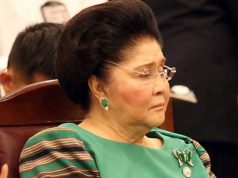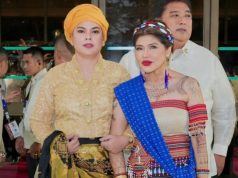
Some clips of ABS-CBN’s primetime show “The Killer Bride” is making rounds on social media for its perceived commentaries on issues like Dengvaxia, a politician’s diploma and the patriarchal system.
Twitter users lauded the dialogue of some characters in the gothic romance series for referencing current and previous issues of national interests in the script.
The ‘fake diploma’ scene
Last August, a scene of Manay Ichu (played by Malou de Guzman) berating Andres Sagrado (played by Soliman Cruz) went viral for how she referenced a politician’s “fake diploma” when she accused him of being “fake” or pretentious.
A Twitter user shared a clip of it, particularly De Guzman’s dialogue, and lauded how it referenced the issue that became of public interest specifically during the 2019 midterm elections.
“mas peke ka pa sa diploma ng politiko”
KILLER BRIDE REALLY DID THAT!!! tangina ang ganda na nga ng kwento, ang ganda pa ng script! pic.twitter.com/hSsrTY0PmT
— john go (@imjohngo) August 29, 2019
It could be remembered that before she won the elections, Sen. Imee Marcos became a hot topic for her educational credentials, which differed from her previously uploaded curriculum vitae when she was still a congresswoman.
According to her, she graduated from Princeton University. But a viral post on Reddit claimed she failed her classes.
It eventually proved to be fabricated. But it led to a series of investigations on her educational background, which revealed that Marcos never received a degree from the Ivy League school despite her claims on her CV.
Other academic institutions such as the University of the Philippines, the Asian Institute Management and the California-based Santa Catalina School similarly debunked her claims and noted that she never graduated from their respective schools.
Up to now, the neophyte senator continues to deflect from questions about her educational background, which leads people to claim she had a “fake diploma.”
The ‘dengue’ scene
Another clip from the famed primetime show also went viral as social media users perceived it to be a commentary on the controversial Dengvaxia issue.
The scene featured Emma Bonaobra (played by Janella Salvador) finding out that a child of a woman was killed due to dengue. The woman lamented that they were never able to avail of the free dengue immunization program in Manila.
It became viral that even spoken word artist Juan Miguel Severo claimed he would treat the episode writer to a drink.
PAG NAKITA KO ANG EPISODE WRITER NG KILLER BRIDE DITO ILILIBRE KO NG BEER https://t.co/D6QVFeUuiq
— Juan Miguel Severo 🏳️🌈 (@TheRainBro) September 28, 2019
Although the scene did not specifically mention Dengvaxia, it featured a scene where a child died from dengue and how a mother thought it could be prevented if the particular vaccine was availed.
It was a reference to the controversy surrounding Dengvaxia, a vaccine launched in 2016 through a mass immunization program that has since been criticized for allegedly causing the death of vaccinated children.
Despite this, the Department of Health insisted there has been no direct link between the children’s deaths and the vaccine itself.
Dengvaxia is approved by the European Union and the United States Food and Drug Administration and is currently licensed to in 20 countries.
The ‘patriarchy’ scene
The same Twitter user who shared the “fake diploma” scene also pointed out that the primetime show managed to empower women with the lines of Alice De La Torre (played by Precious Lara Quigaman).
The scene featured De La Torre talking to Emma about taking the reins of their household, which has long been dominated by men in their family who have made the “worst decisions” for them.
This Twitter user called her strong-willed character a “feminist icon.”
“for years, emma, naghari-harian ang mga lalaki sa pamamahay na ito and they only made the worst decisions for us”
TITA ALICE OF KILLER BRIDE IS A FEMINIST ICON!!! SHE WILL TAKE DOWN THE PATRIARCHY!!! pic.twitter.com/lxnqPc2TQ2
— john go (@imjohngo) August 29, 2019
Her dialogue stood out among the local online community since the Philippines, according to a doctorate degree candidate of Gender Studies at the University of Cambridge, is still considered a patriarchal society.
Particularly referencing President Rodrigo Duterte known to spout misogynistic remarks, the academician said that there is still a “very overt sexualization of women” in the Philippines where incidents of sexual harassment and gender-based violence are still rampant.
“There is still this very overt sexualization of women, and the infrastructure to combat sexism is struggling against a political culture that is still very patriarchal,” Sharmila Parmanand observed.









